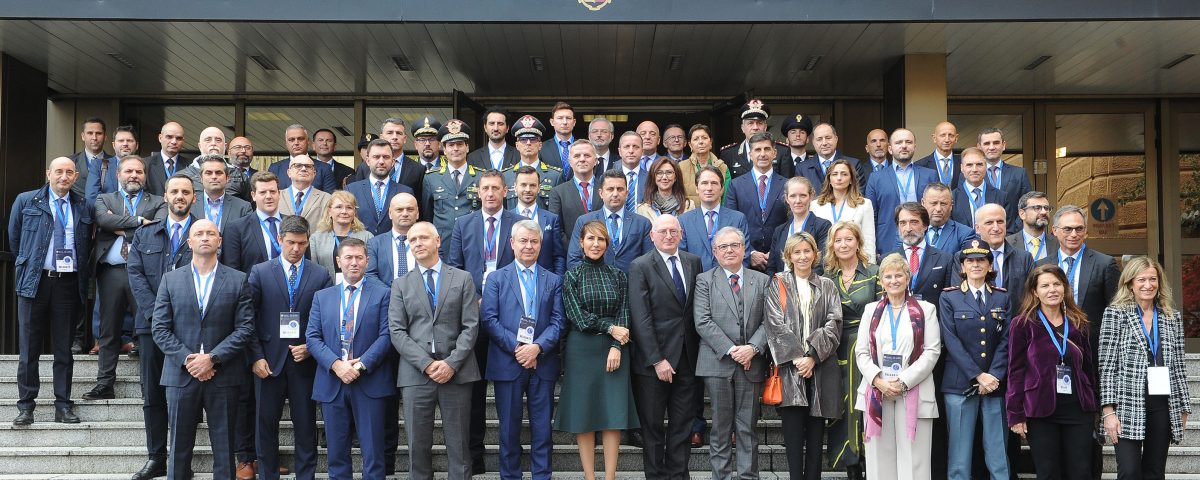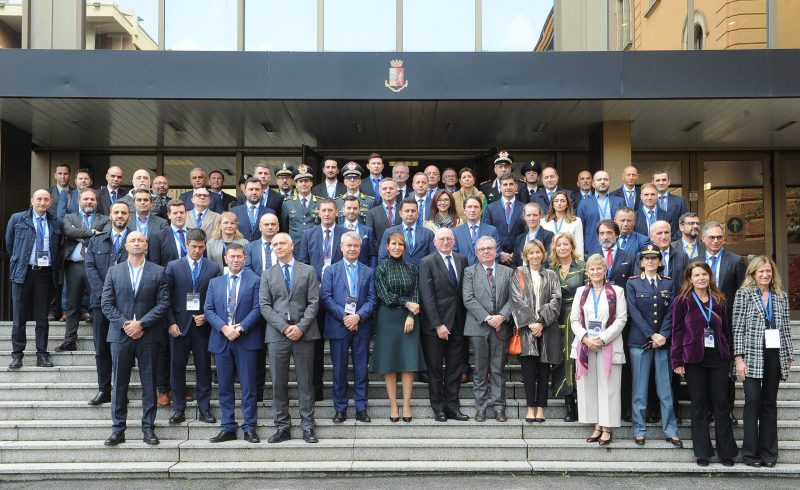Publisher: Cve.gov.al 18/11/2022
Thr CVE Director Mr. Meidani participated in the “RCC Jumbo Security Conference” in Rome

The Director of the CVE Center and the National Coordinator against Violent Extremism and Terrorism, Mr. Denion Meidani, conducted the official visit to the Government of North Macedonia
01/11/2022
Meeting with students of “Marie Logoreci” school – Shkozë, Tirana for information on countering radicalism and violent extremism.
12/12/2022Thr CVE Director Mr. Meidani participated in the “RCC Jumbo Security Conference” in Rome
Thr CVE Director Mr. Meidani participated in the "RCC Jumbo Security Conference" in Rome
The RCC Jumbo Security Conference which was held on November 17 and 18 in Rome, represents the largest gathering of all practitioners, organizations and regional security networks that deal with security issues in Southeast Europe and in particular in the Western Balkans. The Coordination Center for Countering Violent Extremism, was represented by the Director of the center, Mr. Denion Meidani. This organization is increasingly focusing the attention of regional and international security actors in our region and is also helping to create essential links for coordinating and streamlining security cooperation efforts.
The main objective of this 7th edition of the event is to address and define the main security trends that arose (or will be in the near future) from current regional and European insecurities and that will shape the future of security in the Western Balkans and the EU. The conference was organized by the RCC (Regional Cooperation Council) in cooperation with the Italian Ministry of the Interior and the Ministry of Foreign Affairs and International Cooperation.
During the opening speech, the General Secretary of the Regional Cooperation Council (RCC), Mrs. Majlinda Bregu stated that “the EU and the Western Balkans share many emerging security threats, without borders, from radicalization, violent extremism and the return of foreign terrorist fighters to irregular migration, organized crime, corruption, disinformation and cyber attacks . Such common priorities have been re-evaluated by the war in Ukraine, also making clear the important role of the Western Balkans in maintaining the peace and stability of Europe’s eastern borders”.
This conference has put its emphasis on regional cooperation as a necessary element for the smooth running not only of policies related to security but also for economic development in the difficult conditions due to the war, where as Mrs. Bregu stated “82.9% of people in the WB agree that regional cooperation can help their economies for better economic resilience to respond to the negative consequences of war. That is why all these major concerns are not only on the agenda of this year’s Jumbo Security Conference, but will continue to occupy a special place on the agenda of the RCC in the near future”.
In this Conference, in addition to Mr. Denion Meidani, Director of the Coordination Center for Countering Violent Extremism and National Coordinator against Violent Extremism, Mr. Gambacurta, Deputy Director of Public Security in charge of Coordination and Police Force Planning, participated among the representatives from different countries, as well as Vincenzo Celeste, Director General for Europe and International Trade Policy at the Italian Ministry of Foreign Affairs, etc.
Among other things, Mr. Meidani expressed himself in his speech: “Violent extremism is directly related to socio-economic, religious and cultural conditions, perceptions and ideology. Consequently, the “war” on extremism is a poor metaphor, since unlike most wars it has neither a fixed enemy nor any prospect of closure, either through victory or some other conclusion. If there is a “war” against violent extremism, it is a war that cannot be won…such a threat cannot be defeated—only mitigated, diminished, weakened, and somehow controlled! Many young violent extremists today come from the fringes of society, where they are marginalized because legitimate paths to success are closed and they fail to assimilate into the dominant patterns of culture or face new realities. They do not see themselves as fully integrated members of a modern Western multicultural society. For some of them they physically live in the West, but mentally they live in the land of the infidels… Further in his speech, Mr. Meidani continued the reasons that lead to their extremist
struggle – “Marginalization is caused by the convergence of various social phenomena such as poverty, unemployment, academic failure, racial and ethnic hostility, mistrust or mistreatment by authorities, social skill barriers and poor housing opportunities among many people. These conditions generate social rejection, political and economic discontent, and a growing identity complex—especially in today’s young adult populations who cannot anticipate legitimate social, material, and financial success because of constant strain and frustration” -stated Meidani, implying that a good part of the real threat from these phenomena does not come from outside but from our own countries from individuals with radical ideologies who manage to create a threat to the community through networks within the countries where they live. Like Mrs. Bregu and Mr. Meidani gave importance through his speech to joint efforts and interventions at the regional level and beyond for building and further developing resilience, understanding and cohesion in the community. “Regarding the ‘new effect of extremism on CVE policy, it has led to the realization that there must be cooperation within the international community in order to effectively combat the threat. Although some of us are still primarily focused on one path of strength, the importance of social, economic and other internal factors is becoming increasingly clear and vital.” concluded Mr. Meidani.


